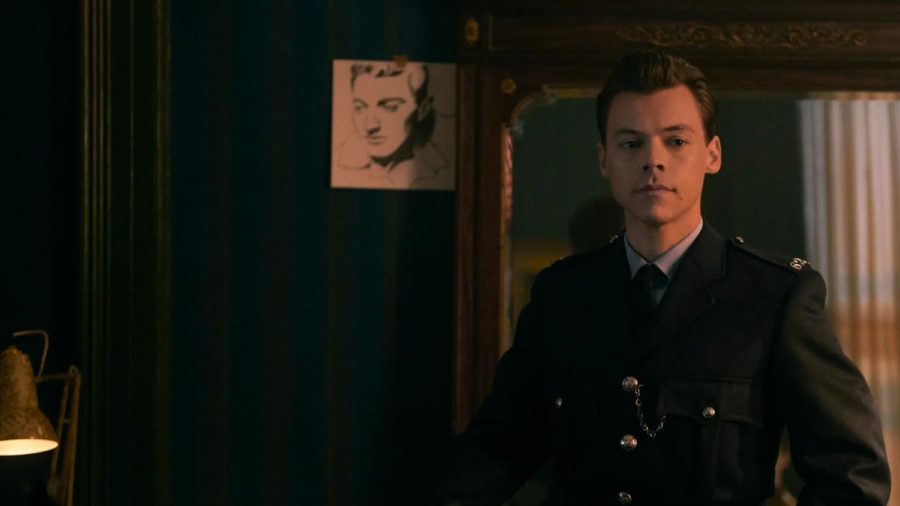“My Policeman”: Harry Styles’ latest attempt at acting
Harry Styles, in his latest movie venture “My Policeman,” with a lackluster queer romance, proves once again that he should stick to his career in music.
November 11, 2022
Hollywood seems hellbent on casting Harry Styles as a leading role in films and unfortunately it’s clear that his main career path has not been as an actor. Considering the widespread criticism of his skills in “Don’t Worry Darling,” his latest film, “My Policeman,” has also failed to deliver the performance necessary for such rich source material, leaving viewers with a surface-level queer period drama that lacked any semblance of depth. Even discounting Styles’ poor execution, the film itself was predictable, unable to get viewers invested in the characters or storylines. Its climax and ending felt overly rushed, wherein the bulk of the film focused on the build up to a plot twist that anyone could have seen coming. Overall, “My Policeman” failed to provide an interesting representation of forbidden queer love and lacked performances that grasped the necessary depth throughout the film.
The film follows an older couple, Tom and Marion—played by Linus Roache and Gina McKee, respectively—, who live in a small town by the sea. Their mutual yet distant friend, Patrick—played by Rupert Everett—, recently had a stroke and instead of sending him to a care facility, Tom and Marion take him into their own home. However, Tom has reservations and refuses to visit or interact with his old friend, leaving his wife to care for him. From this point in the film, it is clear that Marion feels guilty for something and that is the source of her sympathy for Patrick. The film later uncovers that Patrick had been reported for homosexual behavior, almost completely spoiling the twist that doesn’t come until the final minutes of the movie. The movie makes several jumps back and forth in time, between the present and the 1950s. In the ‘50s, Britain has rather strict homosexuality laws and even harsher prison sentences. The film depicts the friendship between Tom, Marion and Patrick—played by Harry Styles, Emma Corrin and David Dawson, respectively—as they explore the lavish world of art and culture. While Tom and Marion are dating, the two men also engage in a secret love affair. Marion knows about the affair, blaming Patrick for encouraging Tom’s ‘tendencies.’ Further into the film, Patrick is reported for acting on his homosexuality and is sentenced to two years in prison. Marion agrees to testify on his behalf, where it is revealed that Patrick kept a diary that recounted his affair with “my policeman” that is publically read during the trial. The ending of the film jumps back to the present, with the expected plot twist that Marion was the one who had reported Patrick and, after dropping that bombshell, decides to leave Tom.
To say the least, the film is boring. The beginning, in an attempt to create an atmosphere of mystery and intrigue, leaves the viewer completely in the dark about the characters’ relationships and the tension between them. Furthermore, it does little to garner any sort of viewer interest in the characters, most likely due to the lackluster performances and inability to convey the stakes prior to the time jump. The characters and their portrayals lack the kind of depth that typically makes these romantic dramas work. Their journey as people is entirely surface-level, focusing solely on the struggle of queer love during a time when this was illegal. But even in that, the acting fails to grasp the emotion necessary to convince the audience of that story. The romance between Tom and Patrick seems entirely sexual and rather one-sided, simply providing an excuse for gay sex scenes starring Harry Styles. Through Patrick’s diary, we are told that he is wildly in love with Tom, semblances of which we can see scattered throughout his advances in the film. However, once again, there isn’t the depth necessary to be convincing for the viewer, we are simply told rather than shown.
It wasn’t only Styles who dropped the ball, as each actor failed to present relatable and dynamic characters. They were all entirely superficial, lacking believable passion during high-intensity scenes. Scenes in which characters were arguing fell completely flat and ended up being hard to watch rather than invoking any semblance of feeling from the viewer. The tone seemed more like a faux argument than something that was actually supposed to be real. The film failed to provide a sense of soul that would have allowed for a deeper understanding of the characters and the plot. Instead, the film substituted the raw emotion that was necessary for a queer film of this caliber for big name actors.
The film is available on Amazon Prime for those of you that wish to formulate your own opinions about it, even if you’re only watching for the erotic Harry Styles scenes.



